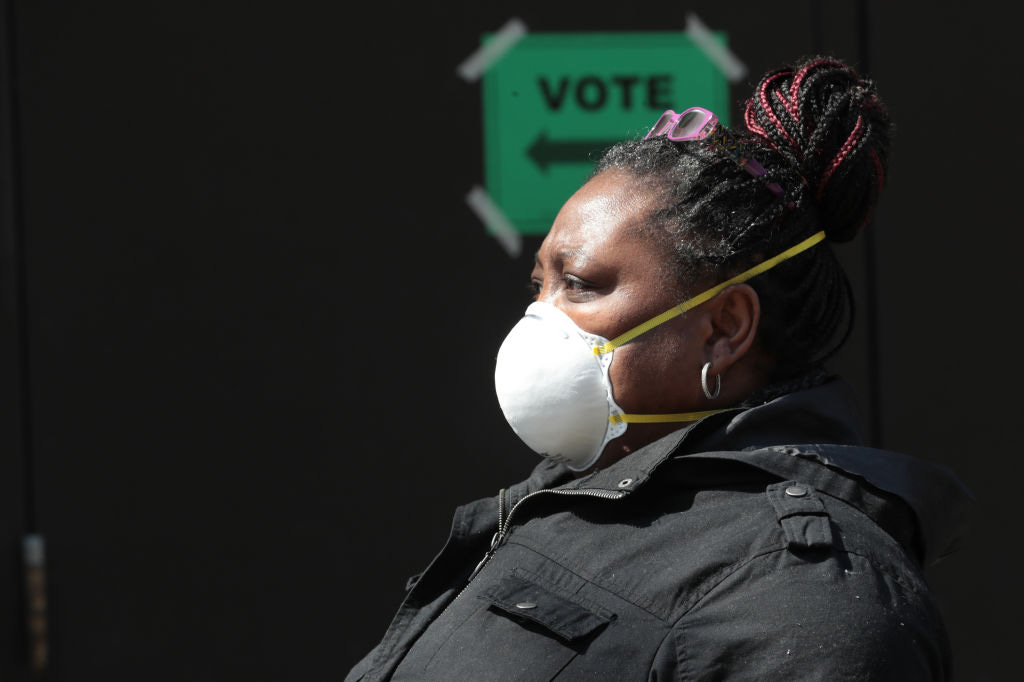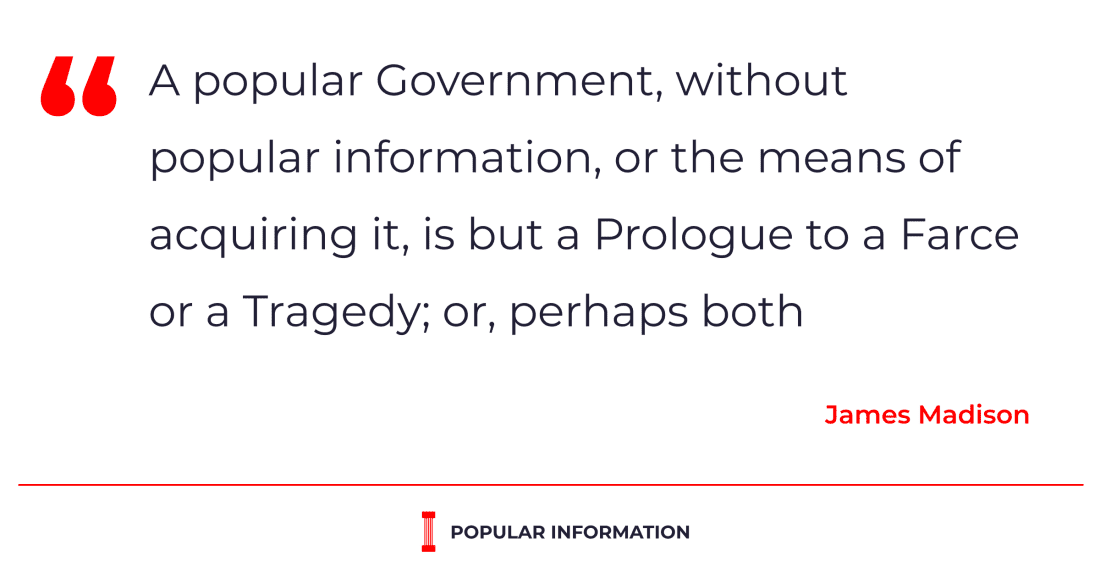 |
A resident waits in line to vote at a polling place at Riverside University High School on April 07, 2020 in Milwaukee, Wisconsin. (Photo by Scott Olson/Getty Images)
In the United States, the coronavirus pandemic has infected at least 1.7 million people, killed nearly 100,000, and cost 39 million their jobs. But for Republican political operatives, it's an unprecedented opportunity.
For decades, a core GOP election strategy has been to make it as difficult as possible to vote. Over the years, Jim Crow laws have given way to voter ID requirements, registration purges, and reducing polling locations. But the coronavirus creates a powerful new way to discourage participation.
On the day of a presidential election, voters jam precincts to make their voices heard — especially in the hours before or after a typical workday. The crowds are always an annoyance. But this year, packing into a church basement with hundreds of people may be legitimately dangerous. The first Tuesday in November could coincide with a second wave of COVID-19 infections.
All Republicans need to do to lower participation is to make alternatives to this process cumbersome.
Over the holiday weekend, the Republican National Committee (RNC) sued California Governor Gavin Newsom. The RNC alleges Newsom "created a system that will violate eligible citizens’ right to vote." What did Newsom do? He issued an executive order to send "vote-by-mail ballots" to "every registered voter." The RNC calls this action "a recipe for disaster."
According to the RNC, sending registered voters ballots "invites fraud, coercion, theft, and otherwise illegitimate voting." These "invalid votes dilute the votes of honest citizens and deprive them of their right to vote in violation of the Fourteenth Amendment."
To support its argument, the RNC does not provide actual evidence of voter fraud connected with mail-in ballots. Rather, it relies on anecdotes from a recent vote-by-mail election in Nevada where one voter found "about a dozen ballots" in his apartment complex's mailroom and "many more in nearby trash cans." Why this voter was rooting through trash cans — and why that proves that Newsom's order is illegal — is not explained.
The RNC lawsuit also relies on flawed analysis by Judicial Watch to claim that the number of registered voters in San Deigo County exceeds the number of registered voters. The organization made similar claims before the Iowa caucuses and had to be corrected by Iowa's Republican Secretary of State. After a report by Popular Information, Facebook removed an ad from Judicial Watch featuring its claim about Iowa voter registration because the ad violated Facebook's misinformation policies.
The RNC lawsuit largely mirrors public statements by Trump, who claimed last week that ballots and ballot applications sent by states to voters were "illegal." (They are not.)
Trump has also struggled to provide any evidence of significant voter fraud from mail-in votes.
Q: And I just wanted to ask you, voters in five states — Utah, Colorado, Hawaii, Washington, and Oregon — all vote by mail. Can you or the White House staff or your campaign provide any evidence to back up your claim that mail-in voting is rife with fraud, like the example you gave of people working in rooms, filling out false ballots?...
TRUMP: The — I think there’s a lot of evidence, but we’ll provide you with some, okay? And there’s evidence that’s being compiled just like it’s being compiled in the state of California, where they settled with Judicial Watch, saying that a million people should not have been voting in — you saw that.
California did settle a lawsuit with Judicial Watch in 2019. But the settlement did not prove that "a million people should not have been voting" in the 2016 election. Trump has made that claim repeatedly, and Politifact rated it "Pants on Fire." The settlement "makes no mention of voter fraud or illegal voting" and did not include an "admission of liability or wrongdoing by the state." Instead, the state agreed to "continue its work to adhere to modern list maintenance procedures under the National Voter Registration Act."
The California lawsuit is just the beginning. The RNC has created a $20 million fund to file lawsuits and engage in other activities to limit voting during the pandemic.
The end of an era
In 1981, the RNC created a “Ballot Security Task Force” during a New Jersey gubernatorial election. The scheme involved "having Republican operatives and off-duty law enforcement personnel hanging around dozens of minority-voting precincts, looking for evidence of election irregularities, and intimidating local voters." Members of the "task force" told "locals that their precincts were being monitored" and wore "quasi-official arm bands," while "physically patrolling polling places in areas made up mostly of minority voters."
It ended up working too well. Republicans narrowly won the election, but the Republican tactics were so brazen that the Republicans lost a subsequent lawsuit. The result was "a 35-year consent decree that included legal restrictions on the party’s efforts to monitor polling locations."
The consent decree finally expired, and Republicans are back to their old tricks. Trump and the RNC plan to recruit "up to 50,000 volunteers in 15 key states to monitor polling places and challenge ballots and voters deemed suspicious."
Quantifying fraud
Election fraud does exist. In 2018, Popular Information documented how a Republican political operative systemically harvested and forged ballots to deliver a narrow victory to a Republican Congressional candidate. The state board of elections ultimately invalidated the results and ordered a new election.
But, in the aggregate, voter fraud is a very small problem. A seminal report by the Brennan Center found incident rates of voter fraud "between 0.0003 percent and 0.0025 percent." It is more likely that an American "will be struck by lightning" than commit voter fraud.
Could voter fraud impact the 2020 presidential election? A review of the 2016 election by the Washington Post found "four documented cases of voter fraud in the 2016 election." Three were Republicans who tried to vote twice, including one who attempted to vote absentee on behalf of her deceased husband.
Voter fraud is not a significant problem. There is, however, "a long history in America of elites using voter fraud allegations to restrict and shape the electorate."
How the Supreme Court could decide the next president again
On Sunday, a federal judge struck down key parts of a Florida law "that would require people with felony convictions to pay off financial obligations before regaining their right to vote." The law was passed by Florida's Republican legislature after voters overwhelmingly approved a 2018 ballot initiative to restore voting rights to most ex-felons. The law effectively undermined the intent of the 2018 initiative because "77% of more than 1 million Floridians with felony convictions who were released had outstanding financial obligations." Very few of those Floridians have the ability to pay.
Florida "has no centralized source that people can consult to find out whether they owe fees, fines or restitution." Figuring out what's due is maddeningly complex. The judge noted that the government was not able to definitively determine the amount owed by the named plaintiffs during the course of litigation.
The judge said it would be constitutional to withhold voting rights to ex-felons that owe money and have the ability to pay. But he put the onus on the government to provide accurate information to ex-felons within a few weeks. Other categories of ex-felons, including those with court-appointed lawyers, will have their voting rights automatically restored.
Most ex-felons in Florida had court-appointed lawyers. So the decision restores voting rights to hundreds of thousands of Floridians before the 2020 election.
Trump won Florida in 2016, but recent polling shows a close race. But the court decision is likely to be appealed to the Supreme Court. If the Supreme Court takes up the case, its decision could determine the next president.
It wouldn't be the first time.
Thanks for reading!
 |


